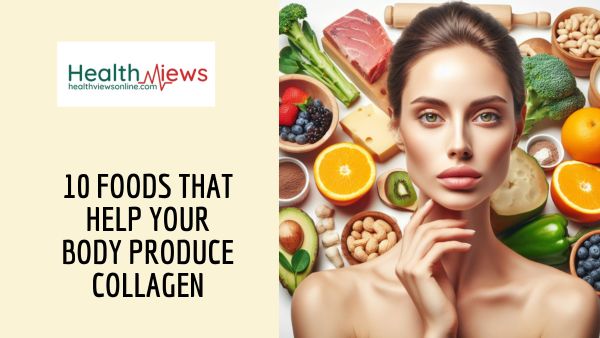The most common protein in the human body is collagen. It can be discovered in the bones, muscles, skin, and tendons. Collagen is used by doctors in wound healing treatments. It is also used in cosmetic preparations to improve the appearance of the skin.
There are other forms of collagen, but human bodies primarily contain types 1, 2, and 3. Every year, we create less collagen in our skin, which contributes to the wrinkles and thinner skin we see as we age. Eating collagen-rich foods can help your body produce more collagen. (Source)
Also, Read Everything You Wanted To Know About Dietary Fibre !!!
Here are the top ten collagen-rich foods to include in your diet to increase your consumption.
1. Chicken
There’s a reason chicken is used in the production of various collagen supplements. The substance is abundant in everyone’s favorite white meat. (You’ve probably seen how much connective tissue poultry contains if you’ve ever sliced up a whole chicken). Because of these tissues, chicken is a good source of dietary collagen.
2. Fish
Fish, like other animals, have collagen bones and ligaments. Some suggest that marine collagen is one of the easiest to absorb. While a tuna sandwich for lunch or salmon for dinner will surely increase your collagen consumption, keep in mind that the “meat” of fish contains less collagen than other, less attractive components.
3. Aloe vera
Aloe vera gel can be applied topically to soothe sunburns, but ingesting aloe also has positive effects on our skin. Aloe in low doses enhanced the amount of collagen in the dermis, the middle layer of skin. The study states that a daily oral intake of 40 micrograms of aloe helped to increase skin barrier function, moisture, and elasticity. While applying aloe vera gel to a sunburn is beneficial, ingesting aloe is another approach to obtain skin benefits. Low doses of aloe boosted collagen content in the skin’s dermis (middle layer). According to the study, consuming 40 micrograms of aloe daily helped to improve skin barrier function, hydration, and suppleness.
Also, watch health views web stories: 8 Foods That Fulfill Your Vitamin E Dose
4. Broccoli
Broccoli is another nice and simple option to increase your vitamin C intake. A cup of cooked or raw broccoli has about a full day’s worth of vitamin C, which is necessary for collagen formation. While vitamin C is required for collagen synthesis, it does not have to be consumed concurrently with collagen-rich foods or supplements. It is adequate to have both in your diet throughout the day.
5. Berries
Choose from blueberries, raspberries, strawberries, or blackberries. They’re all great providers of vitamin C, a substance that helps the body produce collagen. Another vitamin that we must ingest is vitamin C because our bodies cannot naturally generate it. A cup of strawberries has about 100% of your daily vitamin C requirement, while a cup of raspberries or blackberries contains approximately 35% of your daily C requirement.
6. Tropical fruits
Tropical fruits such as mango, kiwi, pineapple, and guava round out the list of vitamin C-rich fruits. Guava also contains a trace of zinc, another cofactor in collagen formation.
7. Citrus fruits
Pro-collagen, the body’s precursor to collagen, can only be made with vitamin C. Getting adequate vitamin C is therefore crucial. Citrus fruits, such as oranges, grapefruit, lemons, and limes, are high in this vitamin. Try serving a salad with grilled grapefruit or orange segments for breakfast.
8. Garlic
Garlic may contribute more than flavor to your stir-fry and pasta recipes. It may also increase collagen production. Garlic is abundant in sulfur, a trace mineral that aids in the synthesis and prevention of collagen degradation. But, given its numerous benefits, it’s recommended to include garlic in your normal diet.
Also, Read All about Calcium: Functions, Daily Dose, Deficiency, Sources & Toxicity
9. Leafy greens
We are all aware of how crucial leafy greens are to a healthy diet. It turns out that they might also provide aesthetic advantages. The antioxidant properties of chlorophyll, which gives salad greens like spinach, kale, Swiss chard, and others their color, are well known. Consuming chlorophyll raises the skin’s level of the precursor to collagen, according to certain research.
10. Beans
Beans are a high-protein diet that frequently includes the amino acids required for the production of collagen. Additionally, a lot of them are high in copper, another nutrient required for the formation of collagen.
If you don’t like the foods given, keep in mind that there is no single source. A protein-rich diet, whether from plant or animal sources, can help supply these essential amino acids. Zinc, vitamin C, and copper are other substances that help with collagen formation. Fruits and vegetables high in vitamins and minerals are therefore beneficial to supple skin. And, for even more dramatic results, avoid excessive sugar and refined carbs, which can induce inflammation and collagen degradation.
Also, watch health views web stories: 8 Foods That Reduce Uric Acid





